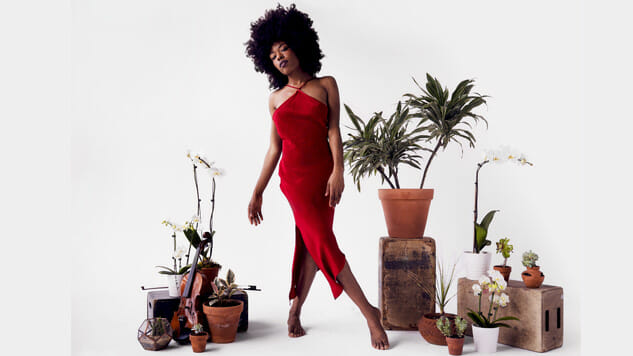Sudan Archives: The Best of What’s Next
The L.A. transplant blends DIY electronica, violin and sultry singing on her debut EP.
Photo by Robb Klassen
Sudan Archives isn’t the name of a person. Not exactly. She’s a musician, but she isn’t from the war-torn East African country of Sudan. Her music is inspired by, but doesn’t actually include, archival field recordings. And yet, Sudan Archives is the perfect name for 23-year-old Brittney Denise Parks. The singer, songwriter, producer and violinist released her self-titled debut EP this past July—a six-song offering that blends DIY electronica, anti-classical fiddling and breathy singing.
But just like how Sudan Archives found an unlikely home on Stones Throw Records, the beloved hip-hop label known for releasing albums by Madvillain and J Dilla, Parks has found that seemingly mismatched sounds, styles and ideas often work out in unexpectedly brilliant ways.
Growing up in the suburbs of Cincinnati, Parks never quite fit in. She was raised in a musical household, but wasn’t drawn to the organized religion her family embraced. She started playing violin in the fourth grade, but her family moved so regularly that she never stayed in one school or orchestra long enough to find continuity in her training.
“When I listen to the traditional African string-player music, it just kind of blanks out everything I have in my head, and whatever comes out of me, it’s just easier for me to start writing and stuff.”
Even her birth name didn’t feel right. Calling from outside Los Angeles, her adopted home of four years, Parks says, “I just told [my mom] that I didn’t really like Brittney, so she just decided to nickname me. Even though I wasn’t really making the kind of music I’m making now back then, I was very interested in my roots and what it means to be African-American. I was always buying African drums and thumb pianos and trying to find the little African shops that have the jewelry and the skirts and the prints. So she would just call me her hippie child, so she thought Sudan would be a nice name because it just sounds really pretty to her and it’s an African country.”
As she continued to discover herself—finding a name that fit, a look that reflected her spirit and a sound that she could create and then mutate—Parks began to rebel. “I grew up in a strict household,” she explains, “just rebelling against curfew, rebelling against having to go to church three times a week, rebelling against the certain type of music my stepdad was just urging me to make with my twin sister, because he was a former founder, label producer guy of LaFace Records.”
-

-

-

-

-

-

-

-

-

-

-

-

-

-

-

-

-

-

-

-

-

-

-

-

-

-

-

-

-

-

-

-

-

-

-

-

-

-

-

-








































